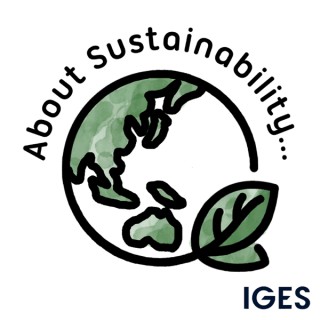Podcasts about iwrm
- 4PODCASTS
- 10EPISODES
- 45mAVG DURATION
- ?INFREQUENT EPISODES
- Jan 10, 2023LATEST
POPULARITY
Best podcasts about iwrm
Latest podcast episodes about iwrm
SDG6: Water, water everywhere, but how is it managed?
In this episode of About Sustainability…Erin and Bob talked to Binaya Raj Shivakoti, an IGES expert in the Adaptation and Water team, about SDG6, which is on “ensuring availability and sustainable management of water and sanitation for all” (or simply ‘Clean Water and Sanitation'). This goal's environmental dimensions are clear, and has targets on the universal and equitable access to safe and affordable drinking water, sanitation, and hygiene for all; improving water quality and water-use efficiency; implementing integrated water resource management; protecting and restoring water-related ecosystems; fostering international cooperation, and involving local communities in water and sanitation management.During our chat, we talked about water being fundamental to all aspects of life and what life can be like for communities without access to these basic needs. We then explored integrated water resource management (IWRM), which Binaya argued is a natural starting point for implementing all the SDGs.Related linksUNDESA's SDG6 PageRecent work on integrated river basin management (a form of integrated water resource management)Binaya's recent publication on Tonle Sap LakeIGES publications relevant to SDG6About our guest:Binaya Raj Shivakoti is a Senior Policy Researcher in the Adaptation and Water team at IGES. His expertise includes, among others, local disaster risk management and planning, promotion of traditional/indigenous and local knowledge, wastewater management, and integrated implementation of the SDGs using river basin approaches."About Sustainability..." is a podcast brought to you by the Institute for Global Environmental Strategies (IGES), an environmental policy think-tank based in Hayama, Japan. IGES experts are concerned with environmental and sustainability challenges. Everything shared on the podcast will be off-the-cuff discussion, and any viewpoints expressed are those held by the speaker at the time of recording. They are not necessarily official IGES positions.
Talk+Water Podcast 4 - Michael Campana, Oregon State University
Michael E. Campana is Professor of Hydrogeology and Water Resources Management at Oregon State University (OSU) and Technical Director of the American Water Resources Association. He formerly directed the Water Resources Program at the University of New Mexico where he is Emeritus Professor. Interests include hydrogeology; hydrophilanthropy; IWRM (integrated water resources management); WaSH (water, sanitation, and hygiene); in developing regions; water policy; managed aquifer recharge; and education. He is an inveterate Water Wonk; as WaterWired he blogs and Tweets on water and related issues. His hydrophilanthropy, The Ann Campana Judge Foundation, supports and conducts WaSH work in Central America.
WASH Talk EP13 - Nature for Water on World Water Day with Patrick Moriarty
IRC's podcast series WASH Talk shares ideas on changes the water, sanitation and hygiene (WASH) sector has to make in order to contribute to achieving universal access by 2030. To do so speakers from all over the world are given a voice in this podcast series. Find out more on www.ircwash.org/washtalk. In light of the 2018 World Water Day theme 'Nature for Water', in this episode WASH Talk host, Andy Narracott speaks with IRC's CEO Patrick Moriarty about climate change, green infrastructure and its relations with intergrated water resources management (IWRM).
WASH Talk EP09 - Integrated Water Resources Management and WASH with Chris Baker and François Brikke
IRC's podcast series WASH Talk shares ideas on changes the water, sanitation and hygiene (WASH) sector has to make in order to contribute to achieving universal access by 2030. To do so speakers from all over the world are given a voice in this podcast series. Find out more on www.ircwash.org/washtalk. In this episode WASH Talk host, Andy Narracott speaks with Chris Baker from Wetlands International and Francois Brikke from Global Water Partnership on how integrated water resources management (IWRM) is affecting WASH services. They talk about climate change; the importance of bringing IWRM and WASH together; the limitations of MDGs and the opportunities of SDGs. Finally, they discuss how the United Nations Environment Programme and DHI's (UNEP-DHI) Centre for Water and Environment is collecting data and monitoring progress of SDG6 target 6.5 by using the indicators of 6.1 and 6.2.







